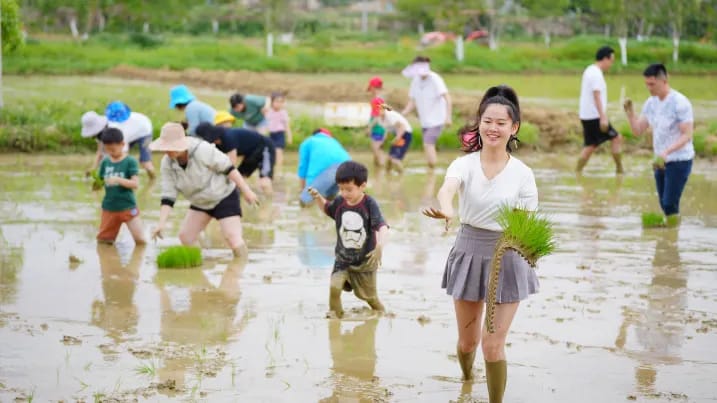The pressures of modern urban life—excessive work hours, soaring living costs, and a highly competitive job market—have created a disconnect between the aspirations of China’s youth and the realities they face. For many, rural life represents a form of resistance, a rebellion against the relentless demands of city living and a corporate culture that prioritizes profit over personal well-being.
This growing movement is driven by China’s economic slowdown and what some call the “devaluation” of a college degree. While higher education was once seen as a ticket to success, today’s graduates are entering a saturated job market where even prestigious degrees don’t guarantee a position. Many of these young people feel trapped—forced to take jobs that don’t align with their qualifications, or worse, to remain unemployed. Faced with limited prospects in cities, some choose to embrace a simpler, slower life, one that allows them to step away from the rat race and reconnect with nature.
This retreat is not just about finding peace but also about redefining success. Instead of measuring achievement through material wealth or job titles, these “retirees” are embracing a lifestyle that values time, personal fulfillment, and community. In the countryside, they are rediscovering the joy of self-sufficiency—growing their own food, building homes, and living in harmony with their surroundings. This shift is reflected in the content they share on social media, where they often challenge the conventional notion that success means working in a corporate office or owning a home in a major city. Instead, they promote a lifestyle of balance, where mental health and contentment are prioritized over external markers of success.
Yet, this rural migration has sparked significant debate within Chinese society. Many view the younger generation’s choice to “retire” as a form of escapism, accusing them of being lazy or unwilling to contribute to the economy. Older generations, in particular, struggle to understand this phenomenon, having themselves endured years of hardship to build China’s modern cities. To them, education and hard work are paramount values, and any deviation from this path is seen as a failure.
But for these young “retirees,” their decision is not about giving up; it’s about survival in a world that seems increasingly indifferent to their struggles. With the job market offering few meaningful opportunities, they argue that they are merely taking control of their lives in the only way they can—by choosing a lifestyle that allows them to live on their own terms. The countryside becomes not just a physical escape but a mental one, a space where they can reflect on what they truly want out of life without the external pressures of society.
Economists like Dan Wang and Keyu Jin suggest that this movement is more of a temporary solution to a larger, systemic problem. While the countryside offers a break from the challenges of urban unemployment, it doesn’t provide the long-term opportunities that young people need to sustain a middle-class lifestyle. Rural areas, while tranquil, lack the infrastructure, career opportunities, and modern conveniences that many in China’s younger generations still seek.
For now, this phenomenon may be part of a broader cultural moment—a reaction to both economic pressures and a deeper longing for personal freedom. Experts agree that this reverse migration is unlikely to be permanent. Many young people will eventually return to the cities, driven by the need for better career prospects and a modern lifestyle. The rural exodus is more of a pause, a moment of recalibration, rather than a full retreat from the ambitions they once held.
In the long run, this movement also highlights a critical need for China to rethink its economic policies, especially when it comes to youth employment and education. If the younger generation continues to feel disillusioned by the job market and its lack of opportunities, the country risks losing some of its brightest minds to a life of disconnection. Addressing these issues may require structural changes—like more support for startups, rural economic development, or reforming the education system to better align with the demands of the market.
While the current wave of “retirements” in rural China may fade, it sends a powerful message about the state of youth in China today. For many, the countryside is not just a refuge but a mirror, reflecting back the frustrations of a generation caught between economic stagnation and societal expectations. And until those issues are addressed, the desire to seek out a simpler life away from the pressures of the city will likely persist.

















+ There are no comments
Add yours